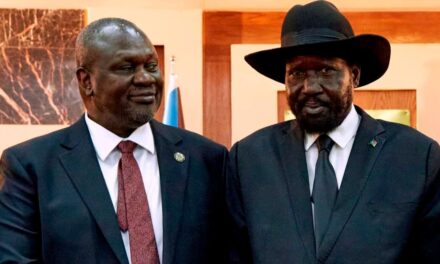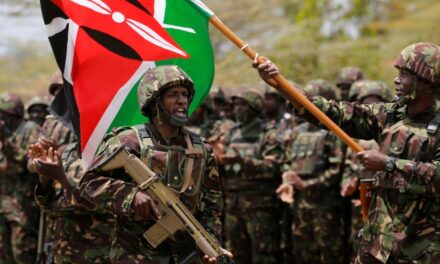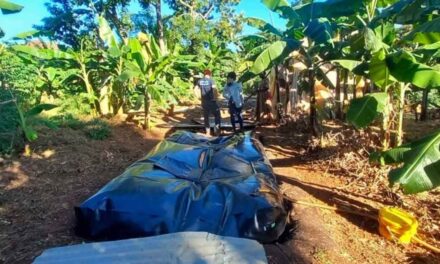
Kenya to Probe Alleged Crimes by British Army in Laikipia
Posted by KFP Editor | Jun 29, 2023 | ACCOUNTABILITY


Kenyan Defence, Intelligence, and Foreign Relations Committee, led by Belgut MP Nelson Koech, has unanimously approved a proposal to launch an inquiry into alleged crimes committed by the British Army Training Unit in Kenya (BATUK) based in Nanyuki, Laikipia County.
The decision to initiate the inquiry follows numerous complaints lodged by residents and key stakeholders regarding the conduct of British soldiers in the county.
These concerns were brought to the committee’s attention during their recent review of the Kenya-UK Defence Cooperation Agreement.
Of particular concern to residents are reports of serious offenses, including the alleged murder of Kenyan woman Agnes Wanjiru in 2012, believed to have been perpetrated by British soldiers in Nanyuki.
Additionally, allegations have surfaced that BATUK activities may have been responsible for the destructive fire that swept through a section of the Lolldaiga Hills Ranch in 2021.
Koech emphasized the significance of the inquiry as a means to deliver justice to aggrieved Kenyans.
He gave the committee’s unwavering commitment to holding visiting troops accountable under Kenyan law for any crimes committed on Kenyan soil.
The committee had previously recommended that foreign soldiers, should they be found guilty of offenses such as murder, be subject to trial in Kenya. Moreover, the issue of corporate social responsibility, particularly about environmental matters, has been underscored as an essential aspect of the inquiry.
According to Article 8 of a confidential military agreement signed between Kenya and the UK in July 2021; Kenya and the visiting UK forces agreed to ensure thorough protection, preservation, and restoration of the environment comprising the training areas, service establishments, and installations.
The defence pact emphasizes that the troops “shall avoid acts that negatively impact on the human health and safety”.
It further adds that visiting troops “shall at all times comply with the host nation’s directions, regulations and laws preserving the environment”.
The committee plans to engage all relevant stakeholders, including residents, civil society organizations, the Kenya Defence Ministry, and the UK Embassy, to ensure a comprehensive and transparent investigation into the matters at hand.
The scheduled commencement of the inquiry is set for August of this year, allowing for thorough fact-finding, testimonies, and collaboration among all parties involved.
This inquiry signifies a significant step towards addressing the alleged crimes and violations, promoting accountability, and safeguarding the rights and well-being of the local community.
PARLIAMENT RECOMMENDATION
The Defence Pact between Kenya and UK was signed on 27 July 2021 and replaced the previous Defence cooperation agreement signed in 2015 and which expired on 6 October 2021.
Through a letter dated 6 September 2021, then Defence Cabinet Secretary, Monica Juma, submitted to the house for approval, a copy of the agreement.
While the then committee on Defence and Foreign Relations of the 12th parliament was considering the agreement to facilitate ratification, the County Government of Laikipia, where the British Army Training Unit (BATUK) is based, tabled a memorandum raising serious concerns on the defence agreement.
The county of Laikipia stated that since the beginning of military activities in Kenya, and despite the presence of binding agreements, BATUK had committed several atrocities to the people of Kenya and the environment.
Laikipia cited the Lolldaiga Hills conservancy fire incident, the murder of Agnes Wanjiru allegedly by a British soldier, and the blast injury upon 10-year-old Lisoka Lessayun in 2015 as examples of the many atrocities committed by the UK army.

This agreement outlines various areas of cooperation between Kenya and the UK, including rules of engagement.
Article 6 (5) of the Defence agreement highlights the various offences which are not to be considered as arising out of official duty and therefore triable by Kenya.
However, murder was not listed as one of the offences thereby allowing cases similar to the Agnes Wanjiru one to occur in the future.
The parliamentary committee further noted that Article 23 of the agreement obligates visiting forces to respect and be sensitive to the local communities traditions, customs, and culture of the places they’re deployed.
The committee recommends that Article 6 (5) be amended, inserting a new paragraph to include murder as one of the offences which are under the jurisdiction of the host nation.
The Koech committee further recommends that Article 23 of the agreement be amended to include Corporate Social Responsibility.
Your support empowers us to deliver quality global journalism. Whether big or small, every contribution is valuable to our mission and readers.



































